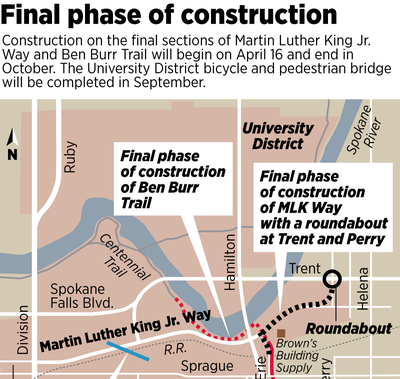New roundabout and bridge to be built on Trent as part of U-District road project

A new roundabout, followed by a bridge replacement project, will disrupt the commute of about 11,000 drivers daily using Trent Avenue east of downtown during the next year.
Beginning Monday, Trent Avenue between Hamilton and Helena streets will be closed through early September for work to build a roundabout at Trent and Perry Street, creating the easternmost terminus of Martin Luther King Jr. Way, the University District thoroughfare.
And next year, the Washington State Department of Transportation will replace the aging, historic East Trent Bridge just west of the city’s project.
The new road will link the city core with the East Central neighborhood, creating a critical connection between two parts of town the city has heavily invested in during recent years – the University District and East Sprague Avenue. The extension will look similar to the existing boulevard, with one lane in each direction, a raised median and 5-foot bike lanes on either side, according to planning documents.
The project also will continue the Ben Burr Trail to the edge of the Spokane River, where it will join an existing spur of the Centennial Trail near the Don Kardong Bridge, a pedestrian and bicyclist crossing to Gonzaga University.
Marlene Feist, director of strategic development for the city public works and utilities department, said the new roads and routes will open a part of town few have seen before, despite its central location.
“It’s a whole new view of our community,” she said. “We’ll see the river from a whole new vantage.”
The work will be done by L&L Cargile Inc. of Spokane Valley, which submitted the low bid of $3.7 million. The bid was approved by City Council this week. The project is funded through a mix of federal, state and local dollars.
The Riverside extension, as the project originally was called, was envisioned in 2009 and started in 2011 with a new road paralleling the railroad tracks between Division Street and Sherman Avenue. Last year, the city extended the road from Sherman to Erie Street, below the Hamilton overpass.
This year’s work will finish the construction of MLK Way, the name given to the road by the City Council in 2011 to honor the civil rights leader.
Feist said the project should be done in October.
But before that can happen, the city must go to court to defend its action to start eminent domain proceedings condemning a parcel of land owned by Ron Brown, owner of Brown Building Materials. The city’s planned route would take MLK Way through Brown’s parking lot on the west side of the building.
The city and Brown negotiated for years about what was needed for the project. At a City Council discussion of the condemnation in June 2016, city officials said the city offered a “fair market value” of $35,000 to Brown for the land it needed for the road. Brown requested $1.9 million for his entire property.
An agreement was not reached. Brown hired attorney Bob Dunn in the matter, and a court date is scheduled for next month.
Feist said the city has an alternate route around Brown’s property as a contingency if a court decision isn’t timely enough for the construction schedule. But she said the city anticipated getting a favorable ruling in time for the new road to be built.
“We’re relatively confident that we’ll get this all buttoned up,” Feist said. “We can condemn the property. We have the right to do this. It’s really just setting value.”
Feist said any money paid to Brown will come from the project funds. If the judgment goes beyond what the city has set aside, a dollar figure Feist would not share, the city would dip into its arterial street fund.
In an interview Tuesday, Brown said the city’s planned route is “going to hurt my business tremendously” but he planned to keep his business going, whether or not the city takes his parking lot.
Brown, whose business has operated in that part of town for 40 years, acknowledged the new road would give him “good exposure” with more traffic, but said he is worried about the ability of freight trucks to safely deliver supplies.
“The way the city has it designed, trucks turn around in the parking lot. I just don’t think it’s safe,” he said. “If I can’t get the trucks in and out of there, I can’t get the stuff I need to sell.”